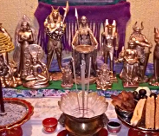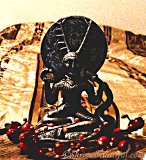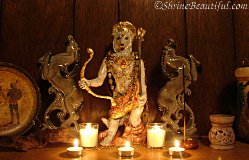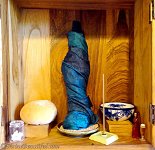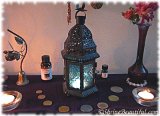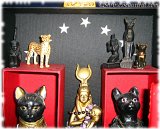Our small temple and its tradition started years ago as a group friends just out of high school meeting in a small one room apartment in Waldron Arkansas to worship in the more open free flowing style, Focusing mostly on the worship of the healing Goddesses Brigaintia, Sulis Minerva, and a mix of Celtic, Norse and Egyptian Deities.
Laura’s Yellow Lotus Temple Shrine
This is my shrine dedicated to Isis, Egyptian mother goddess as well as to Lady Bast, Lord Anubis and Lord Thoth. I see these deities as my celestial […]
Barrack-Shrine to Freyr by Thengill Goðr Freyrsson
How do you use this sacred space? I have only just recently set this shrine up. I bought the base wood plate from TheHeritageTree on Etsy.com; it is […]
Lykeia’s shrine to Apollon Lykeios
This is my shrine of Apollon Lykeios that I pray at in my private room upon rising and before bed. The sculpture I crafted to represent the wolfish […]
Osiris Mysteries Ritual 2012 – Devo
Long before I came to Kemeticism, when I still identified as a Wiccan, my SO concocted a rite to do for Osiris, which he taught to me. I […]
Rose Bell’s Magick Work Altar
As an eclectic that does not work within established religions/paths, my altar is a constantly changing space. It is a functional work space for magick, offerings, healing, and […]
Sobekimiti’s Shrine of Aset and Her Two Guardians
My path is what I call Graeco-Roman Kemetic paganism, and I practice with a syncretised mix of Kemetic, Roman, and Greek influences and Gods. So I honour Aset and […]

